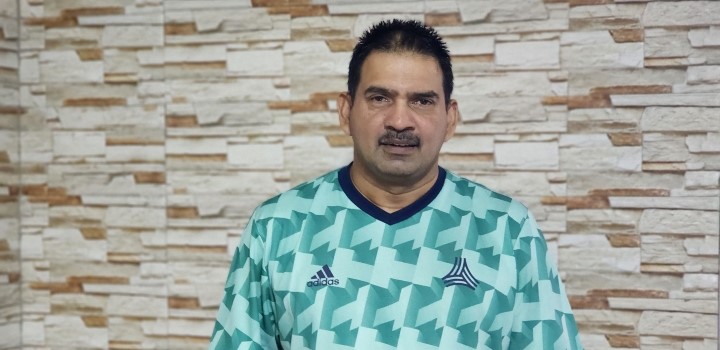Screening picks up Vivakeseelan's diabetic retinopathy early

Vivakeseelan Naidoo found out that he had diabetic retinopathy in its early stages, thanks to a Discovery Health Medical Scheme screening benefit. As a type 2 diabetic, he was at higher risk of developing the condition, which, if left untreated, can cause vision loss and blindness.
During a biannual check up with his diabetes specialist, Vivakeseelan Naidoo showed signs of diabetic retinopathy - a condition which can cause vision loss and blindness.
"I went to the doctor for my diabetes screening, not knowing that anything was wrong," says Vivakeseelan. "But the doctor saw 'diabetic spots' in my eyes and referred me to an ophthalmologist for further screening."
The ophthalmologist diagnosed Vivakeseelan with moderate non-proliferative diabetic retinopathy. "The ophthalmologist told me not to worry yet because the condition was still in a relatively early stage. But he warned me that it would get worse if my sugar was not well controlled."
Diabetic people at risk of developing retinopathy
Vivakeseelan was diagnosed with type 2 diabetes 15 years ago. People who have type 1 or type 2 diabetes are at risk of developing diabetic retinopathy. The condition may not immediately show symptoms, which is why regular eye screening is so important.
Diabetic retinopathy is caused when high blood sugar levels cause damage to the delicate blood vessels behind the eyes over time, ultimately damaging the retina. Early detection of diabetic retinopathy is key in effectively treating the condition and preventing loss of vision. That is why Discovery Health Medical Scheme offers screening designed to catch diabetic retinopathy as early as possible.
Vivakeseelan is a Discovery Health member and is registered on the Chronic Illness Benefit and Diabetes Care Programme, which covers yearly diabetic retinopathy screening.
- The Diabetes Care Programme , together with your Premier Plus GP, will help you actively manage your diabetes. The programme gives you access to various tools to monitor and manage your condition and helps you get high quality coordinated healthcare.
"If my doctor hadn't done the screening, I wouldn't have known there was a problem"
"If my doctor hadn't done the screening, I wouldn't have known there was a problem with my eyes," says Vivakeseelan. "Going for the retinopathy screening feels exactly the same as going for an eye test, except the device photographs the inside of your eyes."
- A fundus camera is used to photograph the inner surface of the eye, including the retina, to show its condition. Screening can be done at a doctor, optometrist or ophthalmologist who has a fundus camera. It's quick and convenient. The photos can be used to track disease progression year by year.
"The main thing that I must do to prevent the retinopathy from getting worse is to control my sugar. I do a finger prick test daily to check my blood glucose (sugar) levels and I use insulin. I must also watch my diet and cut out sugary things. A dietitian previously created a meal plan for me which includes a lot of green vegetables and grilled and boiled, rather than fried, foods."
A year of health complications
2022 has been a difficult year for Vivakeseelan. "In February, I unexpectedly had to go for a quadruple coronary bypass. My son had noticed that I didn't have as much energy as I normally do. I went to my doctor who immediately sent me to a cardiologist."
"The cardiologist did an angiogram and saw that four of my arteries were blocked. They suspect that by then I'd already had a few heart attacks and hadn't noticed them because my diabetes affects my nerves and what I am able to feel. I don't recall having felt any chest pain at all." "That was quite scary. I always thought that the nerve damage only affected my feet and that I needed to be careful not to step on something sharp, because I wouldn't be able to feel it. But it turns out the nerve damage affects sensation and feeling in my entire body."
- According to the Mayo Clinic , people with diabetes can develop diabetic neuropathy. This is damage to nerves in the body. While it mostly damages nerves in the legs and feet, it can also cause problems with the digestive system, urinary tract, blood vessels and heart.
Soon after the bypass, Vivakeseelan developed a diabetic foot ulcer - an open wound - on his heel. "I've had to go for another two operations to remove dead tissue from the wound. I haven't been able to walk properly since February."
Go for health screenings whether you have diabetes or not
Despite what Vivakeseelan calls a "bad patch", he is adamant that he will continue going for his diabetes screenings twice a year and he encourages people with or without diabetes to do the same.
"Before I was diagnosed with diabetes, I wouldn't go to the doctor unless I was sick with the flu or something similar. One morning 15 years ago I felt really sick and was vomiting. That's when the doctor picked up that my blood sugar levels were too high."
"Since then I go for regular check-ups, and the diabetes specialist always pays careful attention to my feet and eyes. Once you've been diagnosed with diabetes, or even if you don't know that you have diabetes, you must go for screenings. It's very important. Now I always tell my children to get screened."
- Discovery Health members have access to essential screening and prevention benefits to check for various chronic conditions, including diabetes. Discovery Health pays for your Health Check from your Screening and Prevention Benefit . This means that it won't affect your day-to-day benefits. Vitality members can get points for doing a Health Check.
Related articles

Rakesh puts every effort into controlling his diabetes and being a role model for his daughter
37-year-old Rakesh Mithal was diagnosed with type 2 diabetes in January 2020. He has since made every effort to live more healthily and prevent the progress of the disease. Joining the Discovery Health Diabetes Care Programme has ensured he and his doctor work in partnership to manage his condition.

Merlin Naidoo gets his type 2 diabetes under control
Merlin Naidoo has been a Discovery Health Medical Scheme member for the past nine years. All was going well until 2014, when he learned that he had developed a chronic condition: type 2 diabetes.

Dr Olivier believes quality of life is important for her patients who live with diabetes
Ensuring good quality of life for people who live with diabetes is key for general practitioner (GP) Dr Christel Olivier. She works towards this goal with the support of the Diabetes Care Programme and the team of health professionals she works with at her practice.